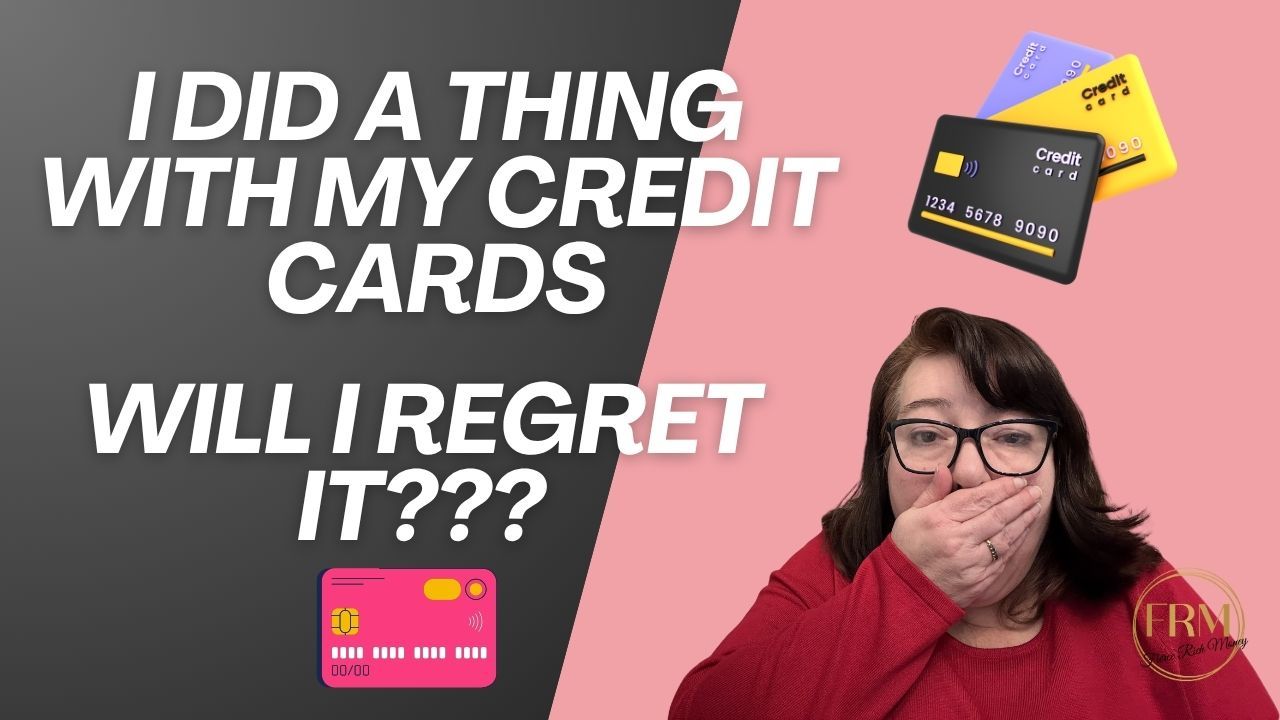Canceling Credit Cards
Jun 08, 2025
Closing credit cards
So I did a thing. It’s a good thing in the long term but a bad and good thing in the short term.
I have six credit cards that are all pretty much maxed out. I cancelled two of my credit cards! Yep, you heard that right—closed them, cut them up, and tossed them out. Actually I shredded them, but you get the picture. I was going to do a third card but psychologically I couldn’t. We will talk about it at the end of the video. Tell me again parts of debt isn’t mindset.
Here’s the kicker, canceling credit cards can temporarily drop your credit score.
Let’s talk about why I did it and why it might be beneficial for you too, especially long-term. However, there are times you should not cancel your card.
First—Why Cancelling Cards Drops Your Score Short-Term:
There are two big reasons your credit score takes an initial hit:
- Credit Utilization: Your score partly depends on how much credit you have available versus how much you're using. This accounts for 20 to 30% of your credit score. Using small numbers, you want to keep this amount to 20 to 30% of debt. So say you have $1000 of available credit. You shouldn’t owe more than $300.
Close a card, your total available credit goes down, and your utilization rate can spike—lowering your score. I did learn that lesson when I paid off my car loan. My credit score dropped 48 points.
- Credit History Length: Closing an older card shortens the average age of your credit history. Banks and lenders prefer a longer history because it shows stability. Closing an old account can knock some points off your score at first.
So, short-term pain, right?
Then Why On Earth Did I Close My Cards know it would hurt me in the short term?
Here’s the real-deal logic behind my decision:
- Debt Freedom Over Temporary Score Hits
I'm looking for debt freedom not just having a nice-looking credit score. Keeping cards you don’t use or that tempt you into spending can and will sabotage your financial goals. If you’re constantly juggling balances, cut out the temptation.
Think of it like breaking up with that toxic ex—at first it’s tough, but long-term? Oh-so-good for you.
- Avoiding Annual Fees and Unnecessary Costs
Both those cards had annual fees, and the benefits just weren’t cutting it. Why pay $95, $150, or even $250 a year for something I don’t really need? Saving money beats having extra credit available any day.
- Simplifying Financial Life
You know I’m trying to simplify my entire life. Fewer cards mean less temptation, fewer payments to track, and more mental clarity. It’s about feeling in control—something more important than a drop in a credit score.
Long-Term, Why This Move Pays Off
After a short-term dip, your credit will bounce back if you:
- Keep your other balances low.
- Keep making on-time payments consistently.
- Avoid new unnecessary debt.
Over time, credit utilization goes back to normal, your score recovers, and often it improves because you’ve simplified and managed your finances more effectively.
Why didn’t I cancel the other card. That’s a credit card from Costco. I cancelled my Costco membership. I had my choice to cancel it right then or let it run out. I chose to let it ride out because I think I was kind of traumatized from canceling the 2 cards. Can you get PTSD from that?
The very nice customer service rep told me that after my membership runs out, the card will be cancelled about 2 months later. I will cancel the card before that. I want it to show closed by consumer. Maybe that’s why I didn’t close it right then, because I know I’m going to close it and just couldn’t bring myself to do it at that moment? I can’t use it because it’s max out.
Why wouldn’t you want to cancel a card? If you’re in the processes of getting a mortgage, or a car loan, or a boat. A boat is my dream. You want to keep your credit score as high as possible. Lower score means higher interest rates.
For those who say you don’t need a credit score to get a mortgage or a car loan. That’s called manually underwriting. That’s when the bank doesn’t use an algorithm. It’s done by an actual living person. If you qualify for this, chances are you’re not watching this channel. You need a bigger downpayment, proof you pay bills on time like your electric bill.
Yeah, my score dipping a bit does stings but I'm playing the long game. And that game’s about freedom, security, and peace of mind. Not a shiny number on a screen.
My friend, if you’re in the same boat, maybe considering cutting ties with a credit card or two, just know the temporary drop isn't forever. Financial wellness and peace of mind? Those are way more valuable and long-lasting.
And remember—financial freedom isn't about a perfect score; it's about creating a life you love.

